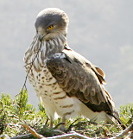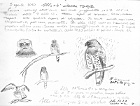These fragments of Short-toed Eagles’ flights have been shot at their breeding territories and hunting grounds in Kiev Region /map/ and in Mizhrichynskyi Park /map/ this year. The video is commented on, please, pay attention on subtitles. You can see eagles A11, B11, K11 and L11 in the clip. Certainly, also other more melodious names were given them for routine use. These STEs occupy their breeding sites within the same home ranges from year to year since at least 2006 and 2010. For a regular observer every bird has obvious individual traits. The video without compression can be downloaded.
Posts tagged ‘breeding’
Findings of the eagles in the Chernihiv Polissya
Sep 27, 2014 / CommentThe northern part of Chernihiv Region, so-called the Chernihiv Polissya /map/, is one of the best regions of Ukraine for Short-toed Eagles’ habitation. These lands, rich in Grass Snakes, Vipers, other reptiles and also in old pine forests, provide the eagles with good conditions for foraging and nesting. An expert in Ukrainian birds of prey, Sergey Domashevsky, during the expedition in 2009 has recorded several probable territorial pairs of the eagles there. Some of them were observed between the Sozh, the Dnieper rivers and Zamglay Bog /map/.
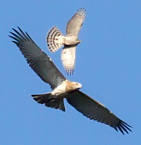 This year a local birdwatcher, Artem Skeeter, has found Short-toed Eagles’ nest at a place where he saw them during a few years before. Artem has discovered the nest just after finding of one old tail feather under a perch at the breeding site.
This year a local birdwatcher, Artem Skeeter, has found Short-toed Eagles’ nest at a place where he saw them during a few years before. Artem has discovered the nest just after finding of one old tail feather under a perch at the breeding site. He has managed to take a video of feeding the juvenile eagle by its father on a pine within the site. Also photos of the birds have been taken there in 2011-2012 and this year by Artem and by Andrew Simon, Viktor Moroz and me. This year’s juvenile could already fly on August 9. The date is the earliest known in Northern Ukraine for the last 10 years. On September 9 another juvenile Short-toed Eagle, judging by all, an offspring of the neighbour pair, was observed in the hovering flight over typical hunting grounds far from forests, that is unusually early for this region too.
He has managed to take a video of feeding the juvenile eagle by its father on a pine within the site. Also photos of the birds have been taken there in 2011-2012 and this year by Artem and by Andrew Simon, Viktor Moroz and me. This year’s juvenile could already fly on August 9. The date is the earliest known in Northern Ukraine for the last 10 years. On September 9 another juvenile Short-toed Eagle, judging by all, an offspring of the neighbour pair, was observed in the hovering flight over typical hunting grounds far from forests, that is unusually early for this region too.
Posts about Short-toed Eagle on the UBPRC website
Jun 29, 2014 / CommentA website of the Ukrainian Birds of Prey Research Centre (Український центр досліджень хижих птахів) exists since 2008. Posts dedicated to Short-toed Eagle have also been published on it. They contain texts, tables and photos. The main of them are represented below:
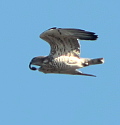 • К. Письменный, 2014 – Спостереження за змієїдами біля їхніх гніздових ділянок [Observations of Short-toed Eagles at their breeding sites] (Uk).
• К. Письменный, 2014 – Спостереження за змієїдами біля їхніх гніздових ділянок [Observations of Short-toed Eagles at their breeding sites] (Uk).
• К. Письменный, 2013 – Некоторые результаты десятилетнего мониторинга змееяда на севере Украины [Some results of ten years monitoring of Short-toed Eagle in the North of Ukraine] (Ru) {related post}.
• С. Прокопенко, М. Бескаравайный, 2013 – Встречи змееядов в Крыму зимой 2013 года [Records of Short-toed Eagles in Crimea in winter 2013] (Ru) {related post}.
• К. Письменный, 2010 – Спутниковое слежение за миграциями змееяда [Satellite tracking of the Short-toed Eagle migration] (Ru)(En).
• С. Домашевский, М. Дравецки, М. Легоцки, М. Олекшак, 2010 – Результаты украинско-словацкой экспедиции на севере Украины [Results of Ukrainian-Slovac expedition to the north of Ukraine] (Ru)(En) {related post}.
• К. Письменный, С. Домашевский, Р. Ватрасевич, 2010 – Практика установки защиты от куниц на гнездовых деревьях хищных птиц [The practice of installing protection against martens for nesting trees of birds of prey] (Ru)(En).
• 2011 – Создание онлайн-определителя возраста и пола змееяда [Creation of online handbook for aging and sexing of Short-toed Eagle] (Ru) {related post}.
• 2010 – Опыт спасения гнезда змееяда [The experience of saving Short-toed Eagle’s nest] (Ru).
Rough translations from the original languages are available on the UBPRC website; please, use the special button in the top menu.
Photo gallery by Bernard Joubert. March 2014
Apr 22, 2014 / CommentWe would like to bring to your attention the 5th gallery of photos taken by Bernard Joubert at a nest of Short-toed Eagle in Haute-Loire /map/. Although the pair has eventually occupied another (last year’s) nest for the breeding, Bernard’s camera has captured scenes of the early nesting behaviour of the birds. Thanks to the researcher, we have a possibility to see unique moments of this eagles’ life once again.
Beginning of ST Eagle season in Europe
Apr 11, 2014 / CommentOne more season of Short-toed Eagles’ stay in Europe has begun recently. Observers watched the first scenes of their breeding activity. Please enjoy some pictures and photos:
Breeding and survey season 2014 started with a rainy day in Maremma, Central Italy /map/. In spite of the bad weather, the pair was doing its job and this is my 38th year with the Short-toed Eagles.
At the first blush the pictures by Francesco are simple and rough, but they are accurate and for an experienced observer all the depicted scenes are easy to imagine in reality.
Bernard Joubert observed the same Short-toed Eagles at their old nest in Haute-Loire /map/ since March 10th. The pair occupied the nest also in 2009 and 2012 years. A special hide allows getting unique knowledge of the behaviour of the eagles and taking magnificent photos. According to a recent message from Bernard, the female has finally chosen another nest – one that was occupied in 2013.
My observations at breeding sites of ST Eagles in Kiev Region /map/ began on April 5th. Like in Haute-Loire the same old pair at first seems to be going to occupy the same nest, for 4th year in a row. Now we have to wait and see what will happen next.
Some results of Short-toed Eagle monitoring in Ukraine
Nov 29, 2013 / CommentMonitoring of 9 different pairs of Short-toed Eagles has been conducted during 10 years in Northern Ukraine (Kiev Region /map/, Mizhrichynskyi Park /map/ of Chernihiv Region, southern part of Sumy Polissya /map/). Some calculations and results of the monitoring are represented in tabular forms:
• K. PISMENNYI, 2013 – Some data on breeding of Short-toed Eagle in Northern Ukraine // short-toed-eagle.net –  ; in the form of XLS file with formulas:
; in the form of XLS file with formulas:  (En).
(En).
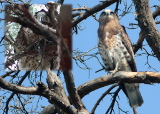 Average breeding success amounts to 0.60 juvenile / territorial pair and is quite close to this index for France: 0.57. The last result is based on observations of 2835 (!) breeding cases which have been managed to make by French national Circaetus gallicus network for 11 years (Bernard Joubert, personal communication). Also some other conclusions can be made: old pines (Pinus sylvestris) are prefered by Short-toed Eagles for nesting in Northern Ukraine; the eagles more often change their nests than they successfully breed; nest height is highly variable; the eagles’ choice of a nest depends on their previous breeding success; after an unsuccessful season the nest is changed with high probability, after successful one the following choice of a nest is unpredictable.
Average breeding success amounts to 0.60 juvenile / territorial pair and is quite close to this index for France: 0.57. The last result is based on observations of 2835 (!) breeding cases which have been managed to make by French national Circaetus gallicus network for 11 years (Bernard Joubert, personal communication). Also some other conclusions can be made: old pines (Pinus sylvestris) are prefered by Short-toed Eagles for nesting in Northern Ukraine; the eagles more often change their nests than they successfully breed; nest height is highly variable; the eagles’ choice of a nest depends on their previous breeding success; after an unsuccessful season the nest is changed with high probability, after successful one the following choice of a nest is unpredictable.
Articles on ST Eagle available online
May 28, 2013 / CommentThe first article is placed on the LPO Coordination Rhône-Alpes website and dedicated to Short-toed Eagles of the Rhône Department /map/:
• Bertrand DI NATALE, 2005 – Le Circaète Jean-le-Blanc Circaetus gallicus dans le Rhône [Short-toed Eagle in the Rhône] // L’EFFRAIE, La revue du CORA Rhône, n° 16: P. 33-38. –  (Fr).
(Fr).
The next two texts can be viewed on the DZPPS site. They are about observations of Short-toed Eagles in Serbia, in Northern Bačka /map/ and also in the Vršac Mountains /map/ (Sr):
• O. Sekereš, 2008 – Dugotrajno zadržavanje zmijara Circaetus gallicus na području Bačke i Banata tokom 2008 [Long-term stay of Short-toed Eagle in Bačka and Banat during 2008] // Ciconia, 17: P. 34-37. –  .
.
• M. Vučanović, 2008 – Podaci o biologiji gnežđenja zmijara Circaetus gallicus na Vršačkim planinama [Data on breeding biology of Short-toed Eagle in the Vršac Mountains] // Ciconia, 17: P. 38-43. –  .
.
A full text of the following new article is not available for free, but you can view the abstract and references (En):
• Michele Panuccio and Nicolantonio Agostini, 2013 – Visible Migration of Short-Toed Snake-Eagles: Interplay of Weather and Topographical Features // Journal of Raptor Research, 47(1): P. 60-68.

